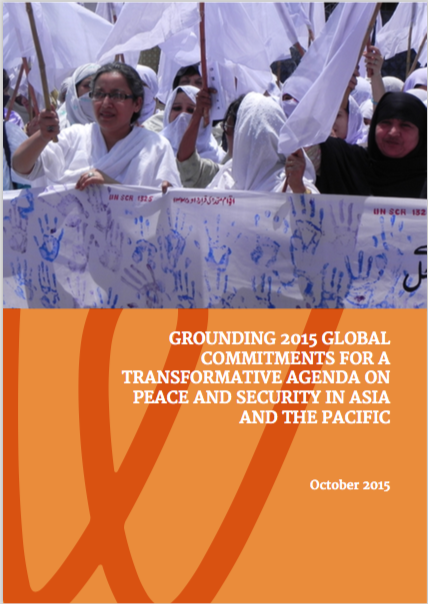A call for women affected by conflict to develop learning communities that produce and share knowledge as an integral part of women’s empowerment in building peace and security.
The women, peace and security agenda – initiated by the UN Security Council – was an imperative 15 years ago and remains so today as persistent gaps in understanding, analysis and implementation have not been eliminated. One critical gap is the inadequate knowledge and understanding by the international community on the complex realities, dilemmas and choices faced by the diversity of women during times of conflict and in post-conflict situations.
Unfortunately, the international discourse and negotiations to integrate women and their interests and gendered concerns into the peace and security agenda have mostly followed predefined frameworks set out far away from lived experiences and on-the-ground with over emphasis on commonalities across diverse contexts. Documentation of women, peace and security issues has mainly been carried out through the intermediary of experts in language and articulations that are often inaccessible or incomprehensible to those, living in conflict settings, who were the very sources of information. Such knowledge-building processes have mostly remained extractive in character and their results disconnected from women’s concrete realities, needs and interests in addressing the difficult dynamics, complex causes and painful consequences of conflict on the ground.
At the same time, macro analyses on the political economic foundations of long-standing conflicts, which are informed by larger geopolitical interests and global trends in demographics and technological development, seldom reach women who are affected by conflict in any meaningful way. These women are making decisions every day to deal with with the challenges of conflict and post-conflict situations and realities. But the experiences and lived realities of women and their critical insights continue to be isolated from experts and academics in the global centers of power and privilege who shape the policies and decisions that affect communities impacted by conflict.
The goal of just, inclusive and lasting peace and security around the world cannot be achieved if the knowledge hierarchy continues to prevail and systematically excludes the women most affected by conflicts and post-conflict situations. By perpetuating inequality in knowledge building on issues relevant to the women, peace and security agenda, we risk another 15 years of slow progress or, indeed, non-progress throughout the Asia-Pacific region.
The Asia Pacific Women’s Alliance on Peace and Security (APWAPS) calls on women in conflict-affected contexts to create and develop learning communities – based on the principle of a reciprocal exchange among equals – on issues and ideas relevant to the transformation of conflict and for the development of just, inclusive and lasting peace and security. Join APWAPS in creating spaces for path-breaking and context-specific conversations and collaborations among peers. Knowledge is power.

